Are unwanted Google search results hurting your reputation? Learn how to remove negative search results or contact us to discuss our online reputation management service at 844-461-3632.
Business owners and individuals are often shocked to find negative information about themselves or their companies in unwanted Google search results. These Google search results are visible to anyone with an internet connection and the ability to conduct a Google web search.
You don’t even have to be behind a computer to use Google anymore. Now, mobile phones account for over 50% of Google search clicks, and local search is especially popular on mobile devices.
Your online reputation is tied directly to the information available about you online. Positive content can improve your business prospects, while negative online content can have the opposite effect. Because unwanted content in search results from Google can influence customer behavior, many wonder if it is possible to suppress negative search results. After all, unwanted search results may stand in the way of your success.
Is it possible to remove unwanted content from the internet? The answer is both yes and no.
In this guide, the content removal experts at NetReputation will share critical details about online content removal. Our online reputation management services deliver trusted results, helping you to restore your hard-earned reputation and improve your online presence.
Read on to learn more about improving Google search results so they work in your favor.
What Type of Information Should You Remove From Search Results?

There’s no straightforward answer about whether or not content can be removed from search results or deindexed in Google and other search engines. Each search engine is different, and search results are driven by a complex algorithm that ranks a wide range of attributes in online content.
Ideally, you’ll be able to remove any information that’s damaging to your business or reputation. However, since a lot of online information is protected, this isn’t always easy.
Here are general guidelines about what you typically can and cannot remove from search results. You may want to focus on the content that’s easiest to remove first and then move onto the information that takes a longer time to have removed or suppressed.
Content You Can Remove from Google Search Results

The type of content you can usually remove from online results include anything that’s private or could put you in danger:
- National identification numbers (U.S. Social Security Number or other personally identifiable information)
- Resident Identity Card
- Bank account numbers
- Arrest records
- Background reports
- Credit card numbers
- Images of signatures
- Nude or sexually explicit images that were uploaded or shared without your consent
- Sexually explicit content in addition to images, including revenge porn, stories, or a blog post
- Confidential personal medical records of private people
- Social networks
- Defamatory content
Next up is the content that’s more difficult to remove from online results.
Content You Cannot Remove from Google Search Results

A lot of your personal information is legally available online, especially if you’ve opted into having it publicly available:
- Date of birth
- Addresses
- Telephone numbers
- Sex Offender Registry listings
- Headline news
- Public records posted by government or law enforcement authorities
Information that’s part of the public record or needs to be made public for society’s sake is generally more difficult or impossible to remove from search results.
There Are Always Exceptions

It’s important to understand that there are exceptions to every rule. Some of the content found in Google search results that would normally be removable may not actually get removed. At the same time, some of the content that is typically not removable can be successfully removed with the help of legal requests or similar legal actions, such as a court order or takedown notice.
Removal requests vary by search engine, and each one has specific procedures for the complete removal of unwanted information or defamatory content online.
Also, remember that every removal request takes time and effort to complete. An online reputation management company can help you suppress or remove negative content, giving you more control over how you are perceived online.
Also, when you’re not able to remove content — either because the site owner isn’t cooperative or you’re trying to remove public record information — suppression is the next best strategy. With suppression services, neutral and positive content is optimized to push down unwanted search results.
While the unwanted content won’t be removed, pushing it down in rank makes it much harder to find. This has a snowball effect because as fewer people find and click on it, those pages will organically lose even more prominence over time.
Is It Important To Remove Unwanted Google Search Results?

The internet has allowed us to grow in so many significant ways over the last few decades, but it’s come with a downside, too.
Today, there’s so much personal information online that anyone with an internet connection can access. Plus, with search engines available worldwide, it takes only seconds for practically anyone to find what they’re looking for.
The ability to pinpoint search results almost immediately means instantly communicating with others and being able to research any topic you can think of. From as far back as 2012, it only took a fraction of a second — less than 1/10 — to return results. Unfortunately, that can come at the expense of your personal safety and security.
When cybercriminals can locate your name, exact address, and email address online in Google search results, it can open you up to harmful activities that could impact your finances, privacy and online reputation. From financial crimes to identity theft, most cybercriminals only need a bit of personal information to create fraudulent accounts, post negative content about you, and more.
How Do Cybercriminals Find My Information?

Personal information can come from numerous sources. Every time you deal with a government agency, information about you is collected. In most cases, some or all of that information may be entered into the public record. This can include marriage licenses, real estate transactions, arrests, and more.
Once your info is on a publicly accessible database, it’s only a matter of time before data brokers republish that information elsewhere. From there, cybercriminals can piece together the details they need to steal your identity.
Cybercrime is a huge and insidious industry. According to the U.S. Department of State, in 2020, cybercrime accounted for $4 billion in losses.
As technological advancements continue, more and more personal information will be just a few clicks away. The rise of social media sites have also made it even easier for criminals to gain access to information about you — data brokers scrape your information from social media and search engines to compile listings that are made available to anyone.
Sadly, removing negative information from the internet is not as fast and direct as removing information you control, such as your personal information on Facebook or your website. It demands time, patience, and energy. It may even require professional help from an online reputation management service provider.
Your personal information is sensitive and must be protected at all costs — especially when this personal information is readily available in search engine results.
How To Protect Your Personal Information Online

The internet has changed how we interact with the world. Information is now at our fingertips, and that includes negative search results on blogs, social media outlets and more. Keeping your information safe online isn’t a one-time practice — it’s an ongoing process that you need to manage indefinitely.
How can you protect your online reputation and manage your digital footprint to take back control?
Here are a few tips:
- Use encryption software when sending files to others. This prevents unauthorized access to your documents.
- Install internet security software on your computer, like a highly-rated antivirus program.
- Be cognizant of what you share online. Limit how much personal info you post.
- Opt out of data-sharing sites so your info doesn’t show up in their search results.
- Learn to spot online scams, like phishing emails that try to steal your information.
Let’s discuss social media some more since this is one of the areas of online information that you have total control over.
Deleting Your Social Media Content

To a lot of people, taking a temporary or permanent break from social media is unheard of. However, it may be exactly what you need right now if you’re trying to suppress negative search results.
According to a report from the Pew Research Center, 11% of people have had their email or social account taken over without their permission. That may not sound like a lot, but if it happens to you, the results can be devastating.
Moreover, 77% of Americans have little to no trust in social media companies when it comes to admitting their mistakes about data misuse, and 89% are worried about social media platforms’ access to personal info about children.
If you decide that a break is the right choice, don’t just delete the application from your device — this won’t actually remove any of your information, and it’ll still be accessible to the public.
When you’re after complete removal of your social media content, you need to delete your accounts. This removes the information from Google search results as well — search engines won’t be able to index content that no longer exists. (Keep in mind that deleting an account means you won’t be able to recover it.)
Getting rid of your social media content lets you take charge of your digital footprint, remove unwanted content and prevent Google’s index from sharing negative personal information about you all in one move.
Consider this: You may actually like disconnecting from social media and going offline for a while!
Make sure to follow the guidelines required by each social platform. Instagram, Facebook, TikTok and other social sites will have their own methods of deleting your content and account.
The Impact of Unwanted Search Results on Your Business

When it comes to running a business, negativity is bound to cross your path. Whether an issue arises from unfavorable press or a negative review, there are many ways that negative online content can tarnish your reputation.
Luckily, it’s possible to overcome even the more serious brand crisis with an online reputation management service. Some of the world’s most popular brands have faced harsh criticism in the past and have been able to rebound from it.
ORM companies help protect your online presence and restore a damaged reputation, whether you’re dealing with negative news coverage, poor ratings on review sites, or negative search results that have climbed to the top of Google results.
Here at NetReputation, we consider two types of negative information to be extremely detrimental to businesses and professionals: bad press and poor customer reviews.
Bad Press

When unflattering information and unwanted Google search results show up on the first page, it can lead to damaging effects on your business:
- Damage to your business’ reputation, which causes distrust amongst customers, investors, employees, etc.
- Stock prices can drop, which can make investors and lenders more cautious. That can affect your ability to raise capital or secure a loan.
- Employees may start looking for another employer. Job anxiety can also impact their productivity.
- News coverage can attract legal attention that may result in fines or other penalties.
News articles and other types of bad press can spread like wildfire. Society is quick to believe rumors and lash out after seeing negative coverage, even if there’s no truth behind it. Few people will stop to dig into a topic and research it to find out what’s actually going on.
Poor Customer Reviews

Customer reviews are extremely powerful. Today, consumers head online to research a brand or professional before deciding to move forward. What other people have to say carries a lot of weight. Here’s what negative reviews can do:
- Having more negative reviews than positive can deter customers from trusting your company. Even having a small amount of recent negative reviews can have an impact.
- Your credibility will be undermined, and customers won’t trust the quality of products or services you provide.
- Your bottom line can be impacted as sales and revenue drop, and you’ll drive business to your competitors instead.
- It’s difficult to retain loyal customers and attract new customers when there are a lot of negative reviews about your business.
Even one negative online review can reduce your monthly revenue, especially when it comes to new business. It’s difficult to attain new customers if they don’t have trust in you from the beginning. Bad reviews signal to potential customers that they won’t have a positive experience if they go with your company.
Your goal as a business owner should be to obtain a 4- or 5-star rating on every platform in your industry.
How To Protect Yourself From Unwanted Search Results
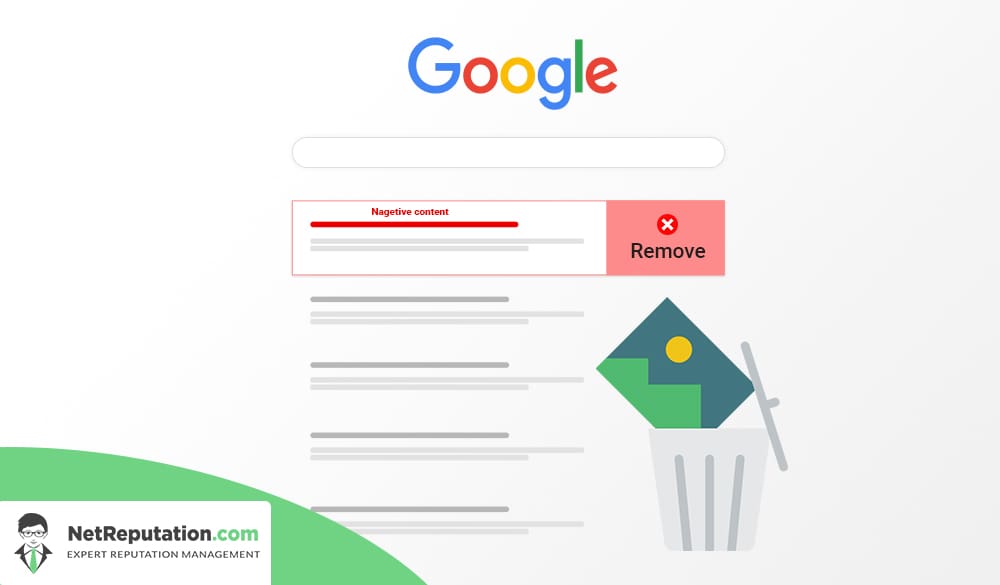
Google Search is a powerful influencer, and search results from Google are an important part of your online visibility. Positive details about your business help to encourage customers, while negative content has the opposite effect. Negative results can hinder your ability to grow your business because it keeps customers away.
Whatever you do, don’t ignore poor search results. Doing so can cause the issue to grow so big that it gets out of control. The worse the situation gets, the harder it will be to fix it.
Taking charge of reputation management in your business is critical: It can and will save your business.
Depending on the severity of the search results out there, you may be in need of crisis management strategies. Our industry-leading reputation management company has a proven track record of success in removing harmful content from Google Search.
Managing Your Online Reputation

As a business owner, it’s important that you monitor and properly manage the online reputation of your brand so that unwanted Google search results don’t wreak havoc on your business or life. There are a lot of steps to take to do this, including:
- Addressing reviews, including positive and negative ones
- Deleting or editing outdated information on social media posts
- Searching Google images to spot any potential problems
- Monitoring Google results for undesirable information
- Submitting a removal request to the site owner
- Auditing your owned content so it’s always accurate and positive
When you remove Google search results or suppress negative search results, you gain control over what information appears online about you or your business.
Also, you’ll want to clean up search results on other search engines, too. While Google is the most prevalent search engine, other search tools shouldn’t be ignored if you want a full online reputation cleanup.
Dealing With Negative News Articles

The most straightforward approach to having articles removed from the internet is to contact the site owner. Include the link to the article and politely ask them to remove the entire article or the negative information contained in it from their site. If you have a lawyer or if you’ve hired an ORM company, you can have them do this on your behalf.
Ideally, the site owner will agree, and removing the information or the entire article will eliminate the negative content from showing up in search results and influencing others.
Since most website owners display their contact information on the bottom of the home page or on a “Contact Us” page, it’s usually not difficult to find a way to get in touch. You could also search the WHOIS database to find contact information for the owner of a website.
Having trouble with the site owner? If you don’t already have a lawyer, this may be when you want to get one involved, especially if the information about you is a threat to your privacy or has been illegally posted. A legal notice can be drafted to the site owner, requesting that the content be removed from the internet.
Note that if the site owner does not agree to remove the information and if that information doesn’t infringe on Google Policies — or any other legal violation — there’s not much you can do to have it taken down. In that case, suppression methods will be used instead to keep the information out of prominent search results.
Handling Customer Reviews

Negative experiences often make a bigger impact than positive experiences, and it’s more common for people to share negative reviews than positive reviews. On top of that, negative reviews can feature prominently on rating platforms and in search results.
Overcoming a negative review takes time and effort. According to Inc., it takes about 40 positive reviews to undo the damage of one negative review. The process can go smoother and be more effective with the help of an online reputation management company.
In addition to encouraging more positive reviews, responding to negative reviews in the right way and in a timely manner will help to diffuse the situation. In fact, this strategy may also yield positive reviews in the future as you reinforce trust between you and your customers.
Your response to the review will hopefully offset the negative feedback and show others who may read it that you are a caring business owner. It’s important to remain professional and friendly. Also, if the mistake was on the part of the business — for example, one of your employees provided poor customer service — it’s important to take responsibility and explain how the situation will be fixed in the future.
Bad reviews are inevitable in the business world. Focusing on service delivery and customer care can help ward off the occasional bad review and prevent negative content from harming your business prospects financially.
Displaying Positive Feedback
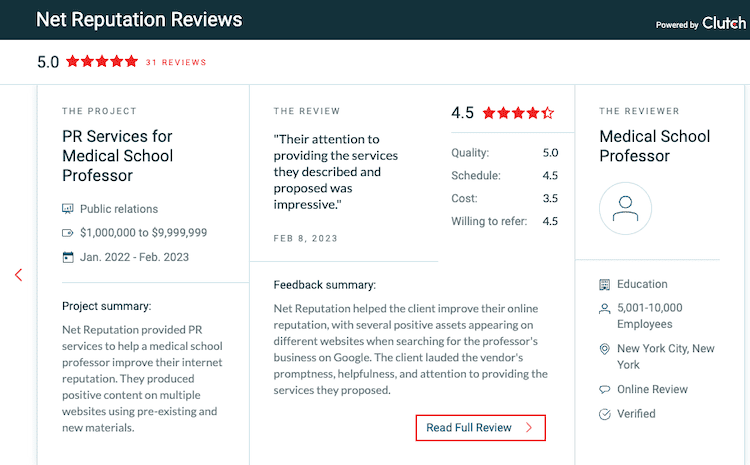
Even with plenty of monitoring for brand mentions, you don’t have complete control over what others post about your business online. However, you can add more positive reviews to web search results by setting up a testimonials and feedback page on your website. Display positive reviews and comments to showcase the great experiences others have had with your business.
One of the easiest ways to encourage customer feedback is to simply ask. After someone purchases a product, signs up for a service, or interacts with your customer support team, send them a brief email that asks about their experience.
By doing this, you’ll gather testimonials that you can use on your website and learn about shortcomings that your business can fix to improve further.
Notifying Search Engines

Whenever you remove negative information from a website — whether the site owner agrees to take it down or you’re able to remove it yourself — it’s important to let search engines know about the change so they can properly index or deindex the page.
Search engines want to return relevant results, and if content has been removed, there’s no benefit to keeping that information in search results.
You can ask that Google refresh outdated content by submitting a request here. As long as a page or image has been removed or modified, you’re able to ask that Google refresh its results for that page.
Click the New Request button.
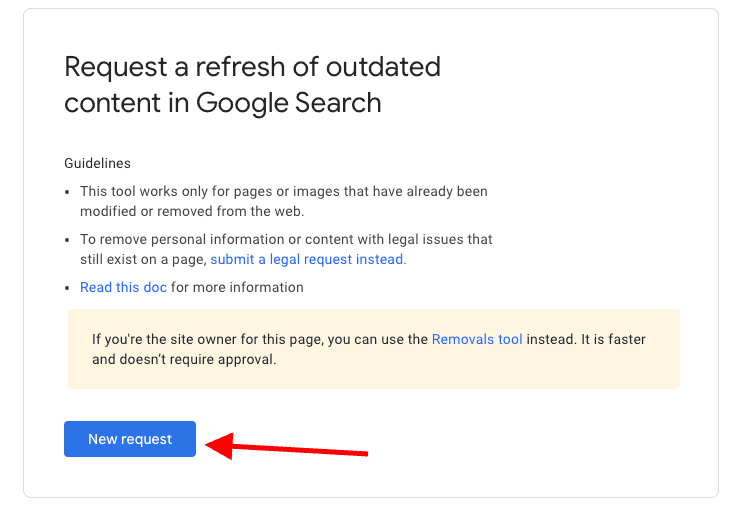
Select your reason for submitting a request.
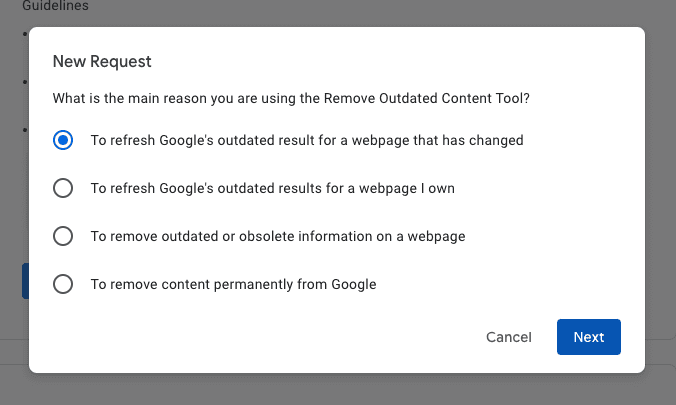
Enter the URL for the page you want updated in Google. If you’re requesting a refresh of an image, click the Image tab and fill out the info there.
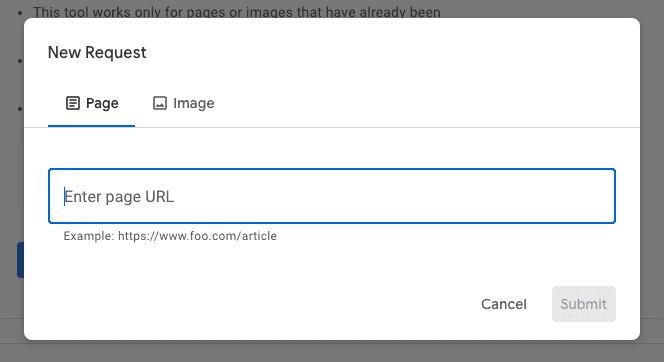
Google’s Support Team typically takes a few days before it updates search results to reflect recent updates.
In general, content removal can require several steps and a significant time and energy investment. However, the payoff is immeasurable if it repairs a damaged reputation and encourages customers to continue trusting your business.
Learn More About Content Removal Strategies
It’s necessary to stay on top of unwanted Google search results in order to manage your online reputation. Search results are able to shape the public’s view of your business, and if customers are influenced to avoid your brand, you’ll lose revenue and business opportunities.
Actively monitoring your online presence, addressing negative content and engaging with your audience can help you control your digital reputation. Not everyone has the time, skills and tools that are needed to do that, though.
Avoiding this responsibility isn’t an option. Today’s digital world is extremely competitive, and if you fail to manage what others are saying and learning about you online, it’s a surefire way to destroy your company.
At NetReputation, we specialize in removing content from Google, helping you achieve high first-page rankings for positive content, and managing your Google review profile.
To learn more about NetReputation’s removal process and how we can help you remove negative content from the internet, complete the form below or call 844-461-3632 for a free consultation.
Request a Free Consultation
Updated 3/2024
